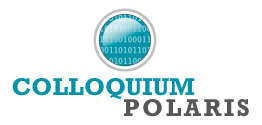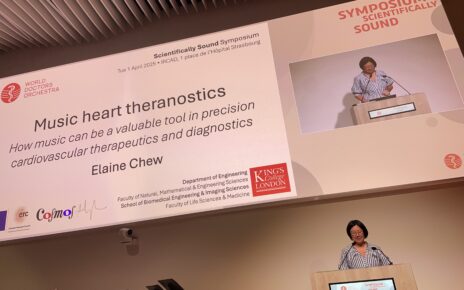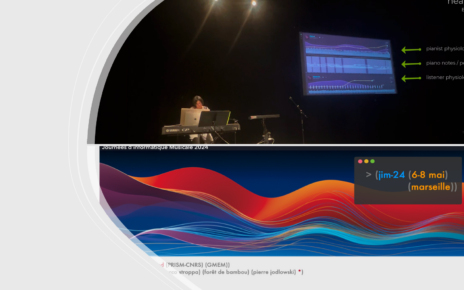Originally on 26 Mar 2020. Postpone / canceled due to COVID.
Thanks to Mathieu Giraud of the Algomus Team (members include Louis Bigo, Florence Levé, Richard Groult, and Ken Déguernel) at the University of Lille, Elaine Chew has been invited to present the Cosmos project at the Colloquium Polaris, a seminar series of the CRIStAL and Inria labs in Lille, with a wide audience of researchers/engineers/students in computer science.
Source : colloquiumpolaris.fr/category/collection
Title :
Emergent Mathematical Structures in Musical Creativity and Cardiac Arrhythmias
Location :
Cité Scientifique – Bâtiment ESPRIT – Amphi « Atrium » à Villeneuve d’Ascq
Abstract :
Treating performance as a problem-solving task, an important aspect of the work of musical interpretation is to discover or make plausible units of coherence at multiple time scales, and to communicate this analysis to the listener. In so doing, the performer influences and shapes the reception and understanding of the music. Over a series of studies, I shall show how computer analysis of performed music can reveal the shape and form of musical structures that emerge in expressive performance. Superimposing these performed structures on score-based information not only shows how these structures are made but also why, thereby enabling more nuanced understanding of the decisions that make for good, and perhaps great, performances.
Music expressivity is one kind of creativity; another involves the generation of note material in the form of composition or improvisation. I shall describe several projects touching upon machine creativity, from human-machine improvisation to music generation with long-term structures based on repeated patterns and tension profiles. The most recent experiments in machine creativity uses physiological rhythm templates learned from electrocardiographic traces of cardiac arrhythmias to create collage pieces from performances of existing works.
Similarities between music and the human heartbeat have long been noted, but mainly in reference to normal heart rhythms. I shall show that abnormal heart rhythms exhibit behaviors akin to the variations introduced in performance and composition, thereby opening the door to applying a host of analytical techniques hitherto reserved for music to cardiac arrhythmias. This novel musical view and description of abnormal heart signals translate to technologies that can facilitate personalized treatment and diagnoses.
Finally, in a study with heart patients with biventricular pacemakers, a collaboration with the Barts Heart Centre, we demonstrate that brain responses to structurally salient events in live music performance can have direct impact on cardiac electrophysiology, with implications for improving the way music is used in therapeutics.
Bio :
Elaine Chew is Principal Investigator of a European Research Council (ERC) Advanced Grant Project COSMOS: Computational Shaping and Modeling of Musical Structures hosted by the Centre National de la Recherche Scientifique (CNRS) at the Sciences et Technologies de la Musique et du Son (STMS) laboratory located at the Institute de Recherche Coordination Acoustique/Musique (IRCAM) in Paris, France. She is also a past recipient of the Presidential Early Career Award in Science and Engineering (PECASE) and an NSF Faculty Early Career Development Award (CAREER), and fellowships at Harvard’s Radcliffe Institute for Advanced Study. She is an alum (Fellow) of the NAS Kavli Frontiers of Science Symposia and NAE Frontiers of Engineering Symposia for outstanding young scientists and engineers.
Her research centers on the mathematical modeling and computational analysis of music structures, with recent applications to cardiac signal analysis. She is author of numerous research papers and a recent monograph on Mathematical and Computational Modeling of Tonality, the first volume on music in the Springer International ORMS Series. Her research has been supported by the ERC, EPSRC, AHRC, and NSF, and featured on BBC World Service/Radio 3, Smithsonian Magazine, Philadelphia Inquirer, Wired Blog, MIT Technology Review, The Telegraph, etc. She is centre of one of 9 publication clusters having ≥ 5 women in the international music information retrieval community (2016 ISMIR infometric study).
She received PhD and SM degrees from the MIT Operations Research Center, a BAS in Mathematical and Computational Sciences (honors) and Music Performance (distinction) from Stanford, and FTCL and LTCL diplomas in piano performance from Trinity College, London. She has served as Professor of Digital Media in Queen Mary University of London’s School of Electronic Engineering and Computer Science and tenured Associate Professor at the University of Southern California where she held the inaugural Viterbi Early Career Chair and joint appointments in the Viterbi School of Engineering and Thornton School of Music (courtesy). She has been Visiting Faculty at Harvard and Lehigh, Affiliated Artist at MIT, and served on the Visiting/Scientific Committees of IRCAM, Georgia Tech’s School of Music, and MIT’s Music and Theatre Arts.




